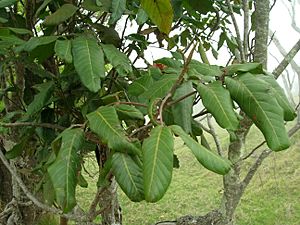Alectryon macrococcus facts for kids
Quick facts for kids Alectryon macrococcus |
|
|---|---|
 |
|
| A. m. var. auwahiensis | |
| Conservation status | |
| Scientific classification |
|
| Kingdom: | Plantae |
| Clade: | Tracheophytes |
| Clade: | Angiosperms |
| Clade: | Eudicots |
| Clade: | Rosids |
| Order: | Sapindales |
| Family: | Sapindaceae |
| Genus: | Alectryon |
| Species: |
A. macrococcus
|
| Binomial name | |
| Alectryon macrococcus Radlk.
|
|
| Script error: The function "autoWithCaption" does not exist. | |
Script error: No such module "Check for conflicting parameters".
Alectryon macrococcus, known as ʻAlaʻalahua or Māhoe in Hawaiian, is a special kind of flowering tree. It belongs to the soapberry family. This tree is endemic to Hawaii, which means it grows naturally only in Hawaii and nowhere else in the world.
Contents
Meet the 'Ala'alahua Tree
The Alectryon macrococcus tree can grow up to 11 meters (about 36 feet) tall. Its leaves are made up of several smaller, oval-shaped leaflets. These leaflets have a cool pattern of veins that look like a net.
Where Does This Special Tree Live?
There are two main types, or varieties, of the Alectryon macrococcus tree. Each variety lives in slightly different places:
- Alectryon macrococcus var. auwahiensis is found only on the island of Maui. It grows in Hawaiian tropical dry forests on the south side of a volcano called Haleakalā. You can find it at elevations from about 360 to 1070 meters (1,180 to 3,510 feet) high.
- Alectryon macrococcus var. macrococcus lives in slightly wetter forests, known as mesic forests. This variety grows on the islands of Kauaʻi, Oʻahu, Molokaʻi, and western Maui. It lives at elevations from about 365 to 1035 meters (1,198 to 3,396 feet).
What Does the 'Ala'alahua Look Like?
The leaves of the Alectryon macrococcus tree are quite interesting. Each leaf is made up of several smaller, oval-shaped leaflets. These leaflets are not perfectly even on both sides, making them asymmetrical. They also have a clear pattern of veins that looks like a net.
One type, Alectryon macrococcus var. auwahiensis, has a special feature: the undersides of its leaflets are a rusty-red color.
The tree also produces fruits. Inside these fruits, there is a seed covered by a bright red, fleshy part called an aril. This aril is sweet!
Why Is This Tree Endangered?
Sadly, the Alectryon macrococcus tree is critically endangered. This means it is at a very high risk of disappearing forever. There are a few reasons why:
- Habitat Loss: A big problem is habitat loss. The places where these trees naturally grow are being destroyed or changed.
- Rats: The sweet red arils around the seeds are tasty, but they also attract rats. When rats eat the seeds, it stops new Alectryon macrococcus plants from growing. This makes it harder for the endangered species to reproduce.
- Black Twig Borer: A tiny insect called the black twig borer (Xylosandrus compactus) also harms these trees. This insect damages the small branches, called twigs, which can weaken or even kill the tree.
Traditional Uses
Long ago, the sweet red arils from the fruits were an important food source for native Hawaiians.
 | Shirley Ann Jackson |
 | Garett Morgan |
 | J. Ernest Wilkins Jr. |
 | Elijah McCoy |


